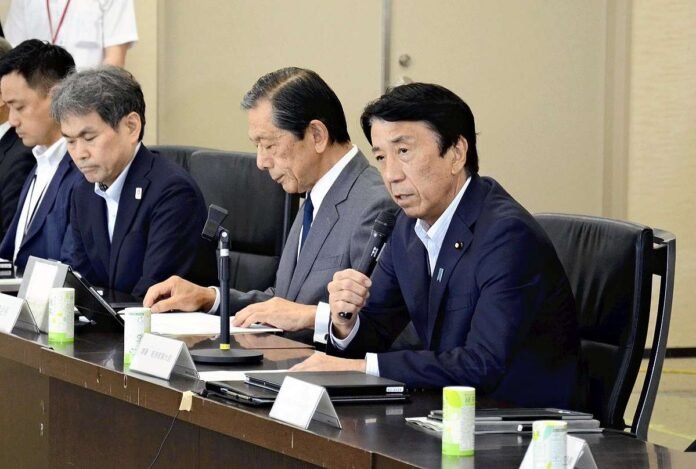Industry Minister Ken Saito (right) speaks during a subcommittee meeting of the Advisory Committee on Natural Resources and Energy on Wednesday.
13:02 JST, May 16, 2024
Tokyo, May 15 (Jiji Press) — Japan’s Industry Ministry on Wednesday began a review of the country’s basic energy plan, at a time when power-hungry data centers are increasing in line with the spread of artificial intelligence.
The Basic Energy Plan sets the direction of the country’s energy policy in the medium to long term and is updated every three years.
The review is expected to focus on how to fit nuclear power plants and renewable energy sources, both of which are effective in reducing CO2 emissions, into the country’s energy supply mix, amid the accelerating global trend towards a low-carbon economy.
The review was launched during the day meeting of the subcommittee of the Advisory Committee on Natural Resources and Energy, which advises the Minister of Industry.
Referring to the energy shift away from fossil fuels such as oil and coal, Industry Secretary Ken Saito said at the start of the meeting: “Japan is in its most difficult situation since the end of World War II.”
“Whether we can guarantee a stable supply of non-carbon energy will determine a large part of our country’s national power,” Saito emphasized.
The government has set itself the target of reducing CO2 and other greenhouse gas emissions to virtually zero by 2050. On Monday, she launched discussions on a long-term vision for decarbonizing the economy towards 2040. She aims to establish the long-term vision and update policy plans. baseline energy plan by the end of fiscal year 2024, which started in April.
To decarbonize, it is essential for Japan to reduce its dependence on thermal power generation, which accounts for about 70 percent of the country’s total energy supply. The current baseline plan, drawn up in 2021, calls for 36 to 38 percent of total energy supply in the 2030 budget year to come from renewable energy sources, and for 20 to 22 percent from nuclear power plants.
At the press conference, Saito noted the increasing importance of dealing with geopolitical risks, given Japan’s dependence on imported energy sources.
According to the Ministry of Industry, liquefied natural gas prices have increased on average about sixfold between 2019 and 2022 as a result of Russia’s invasion of Ukraine.
The deteriorating situation in the Middle East is also overshadowing Japan’s energy purchasing, as the country imports about 90 percent of its crude oil from the region.
The revision of the energy plan is expected to include discussions on increasing the share of energy generated from renewable energy sources and on the positioning of next-generation nuclear power plants under development in the public and private sectors.
Meanwhile, the use of AI has spread rapidly since the update of the Basic Power Plan in 2021. Generative AI such as ChatGPT consumes significant amounts of power when processing large amounts of information.
Ensuring a stable electricity supply is becoming increasingly important in light of projects to build or expand data centers for AI services and to build factories for semiconductor production.
According to the Organization for Cross-Regional Coordination of Transmission Operators, which includes electric utilities, maximum energy demand in fiscal year 2033 is expected to be 5.37 million kilowatts higher than in fiscal year 2023, due to construction and expansion of data centers and semiconductor factories. This corresponds to the production of approximately five nuclear reactors.
Energy demand could increase further as the growth in the amount of information processed by advanced AI accelerates.
At the same time, the effective use of AI is essential for increasing the international competitiveness of Japanese industry. “We must avoid a situation where the use of generative AI is hampered by power constraints,” said Mitsubishi Research Institute Inc.
The institute pointed out the need to develop energy-saving technologies for semiconductors. But if such measures are not enough to address growing energy demand, the think tank said it will be necessary to make preparations, including increasing energy production.



